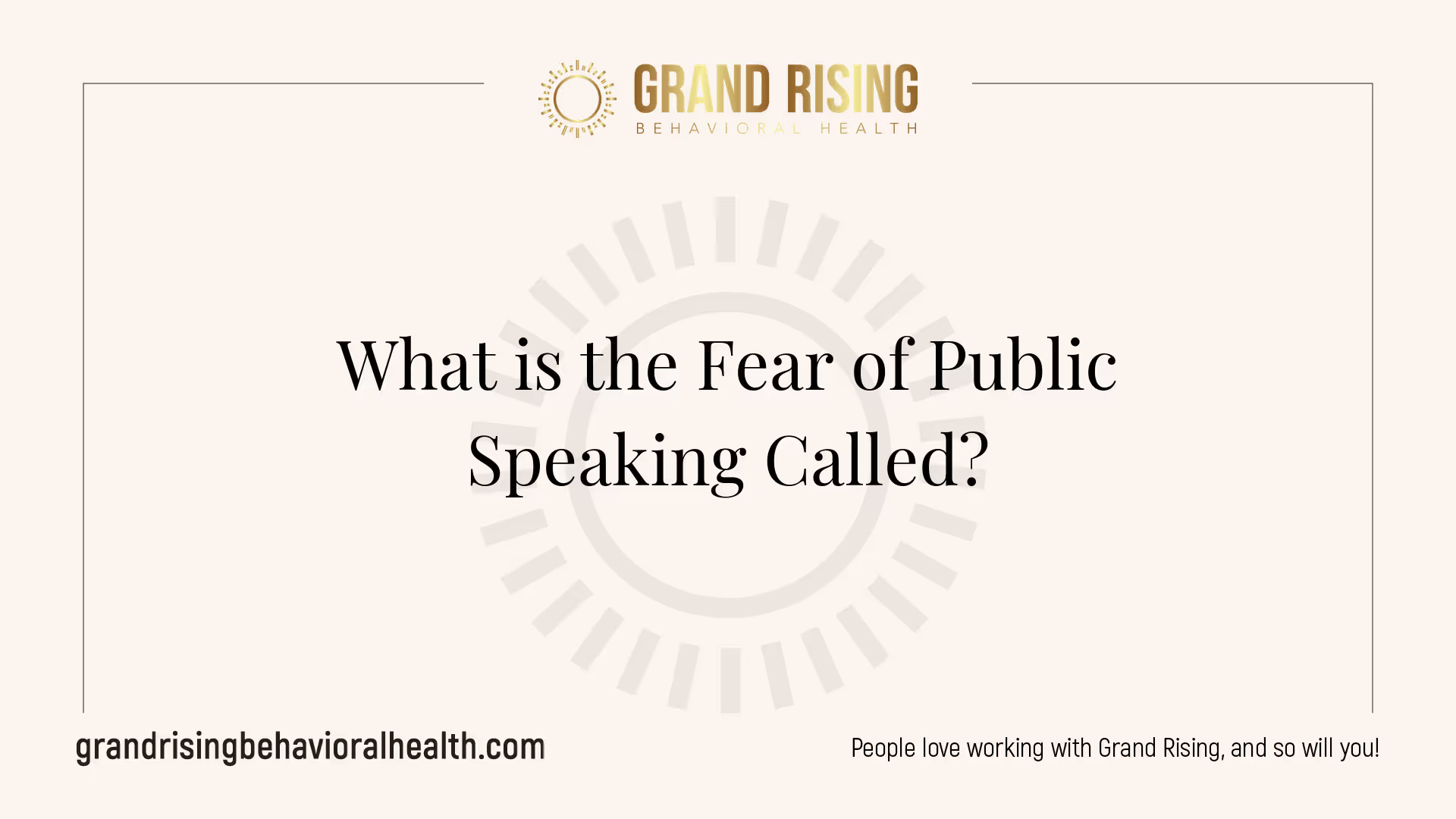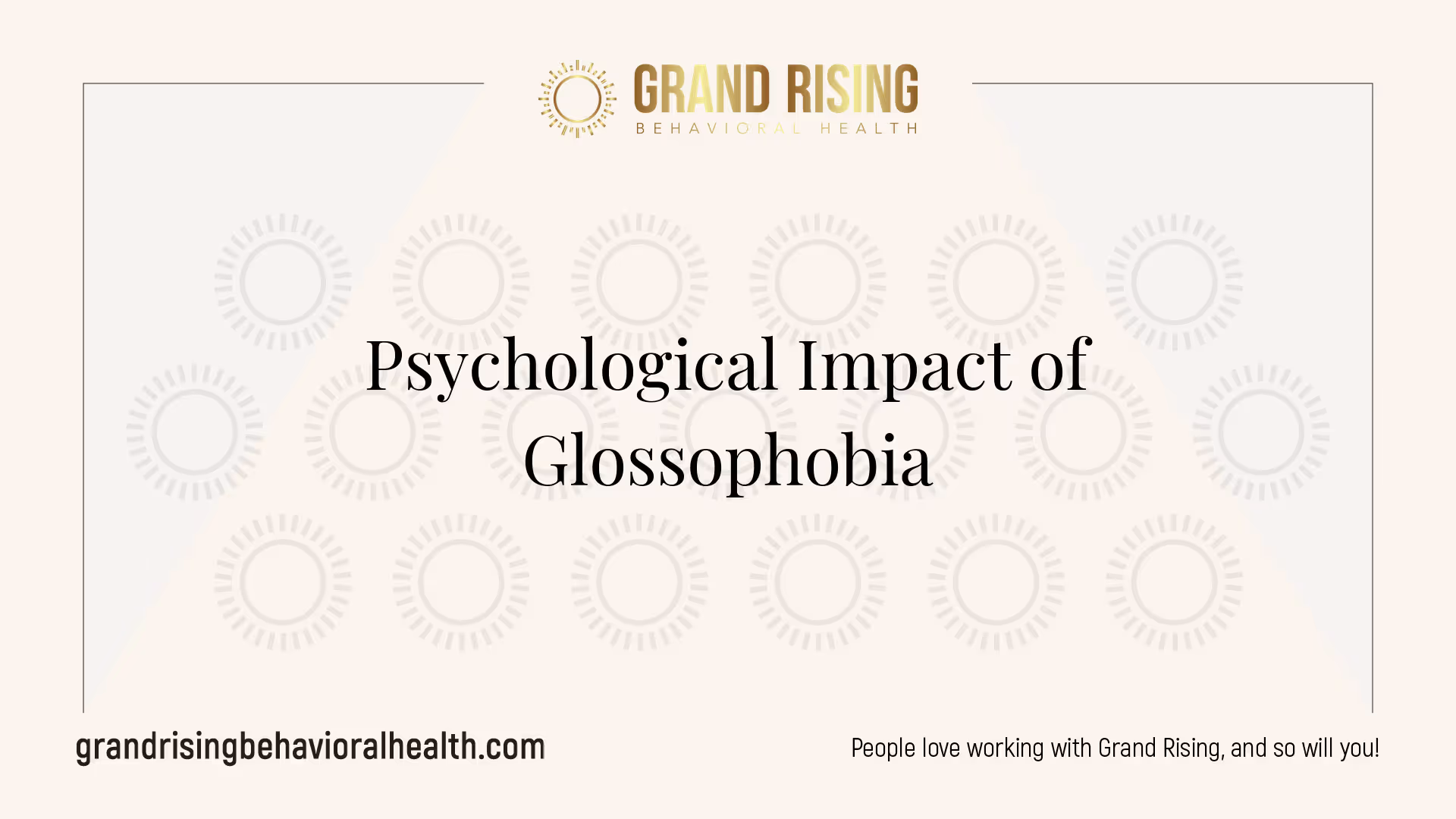What is the Fear of Public Speaking Called?
Discover what the fear of public speaking is called and learn how to overcome glossophobia effectively.

Understanding Glossophobia

What is Glossophobia?
Glossophobia refers to the intense fear of public speaking that many individuals experience. It can trigger a range of physical and emotional responses such as discomfort, anxiety, trembling, sweating, and a racing heartbeat when speaking in front of a group. This fear is not uncommon and affects a significant proportion of the population. According to Healthline, as many as four out of 10 Americans struggle with glossophobia.
Prevalence of Glossophobia
The prevalence of glossophobia is notable, with estimates indicating that approximately 75% of people worldwide experience some level of fear or anxiety regarding public speaking. This amounts to over 200 million individuals who feel nervous when talking to others. Furthermore, about 15% to 30% of individuals globally suffer from glossophobia to a degree that interferes with their daily activities, including work and education.
StatisticPercentagePeople affected by glossophobia worldwide75%Individuals with glossophobia in the U.S.40%Individuals experiencing significant disruption in daily life10%
Glossophobia can impact both personal and professional growth, making it a crucial mental health concern. For more information on anxiety and its effects, refer to our articles on what is anxiety? understanding the basics and the physical symptoms of anxiety explained.

Factors Influencing Glossophobia
Understanding the factors that contribute to glossophobia can help in addressing and managing this common fear. Various elements, including gender, education levels, and racial disparities, play a significant role in how individuals experience the fear of public speaking.
Gender Disparities
Gender differences significantly affect comfort levels regarding public speaking. Research indicates that men generally feel more at ease when speaking in front of an audience compared to women. According to data, 44% of women report being fearful of public speaking, while only 37% of men share this sentiment.
GenderPercentage Afraid of Public SpeakingWomen44%Men37%
Education Levels and Glossophobia
Education appears to influence the prevalence of glossophobia. A survey revealed that only 24% of college graduates expressed fears related to public speaking. In contrast, a significantly higher percentage, 52%, of individuals with a high school diploma or less reported similar fears. This suggests that higher education levels may correlate with increased confidence in public speaking scenarios [3].
Education LevelPercentage Afraid of Public SpeakingCollege Graduates24%High School Diploma or Less52%
Racial Disparities in Glossophobia
Racial background may also contribute to differences in experiences with glossophobia. In a survey, 43% of white individuals reported fears related to public speaking. Conversely, only 34% of respondents from other racial backgrounds expressed similar concerns. This disparity shows that racial factors can impact how fear manifests in varying demographic groups [3].
Racial BackgroundPercentage Afraid of Public SpeakingWhite Individuals43%Other Racial Backgrounds34%
By examining these factors, individuals can better understand the dynamics of their own fear of public speaking and consider strategies to overcome it. For practical tips on handling this anxiety, visit our page on overcoming fear of public speaking.

Psychological Impact of Glossophobia
Impact on Individuals
Glossophobia, known as the fear of public speaking, can have a significant psychological impact on those who experience it. This fear often manifests as heightened anxiety and stress, especially in situations requiring speaking in front of a group. Individuals may feel perfectly comfortable in other social settings, such as meeting new people, but the thought of delivering a speech can trigger intense anxiety similar to performance anxiety or stage fright [4].
The consequences of glossophobia extend beyond the moment of speaking. Individuals may avoid opportunities that require public speaking, leading to missed career advancements or social engagements. This can cause a cycle of shame, frustration, and isolation, further exacerbating feelings of anxiety. Approximately 12.1% of U.S. adults experience social anxiety disorder at some point, with many individuals developing symptoms before the age of 20 [3].
To illustrate these impacts, the following table outlines common negative consequences faced by individuals with glossophobia:
ConsequenceDescriptionCareer LimitationsAvoiding promotions or roles that require public speaking.Social WithdrawalReduced participation in social events due to fear.Decreased Self-EsteemNegative self-perception stemming from public speaking anxiety.Increased Anxiety SymptomsPhysical symptoms like sweating, shaking, or nausea.
Developing Glossophobia in Adolescence
The development of glossophobia often begins in adolescence. During this critical developmental stage, many individuals encounter heightened social expectations and peer pressures. Factors such as genetics may influence feelings of anxiety, stress, nervousness, and shyness.
Adolescents may experience negative public speaking experiences, which can reinforce fears and contribute to the development of glossophobia. Its onset can be influenced by various factors, including family history, environmental triggers, and prior negative experiences associated with speaking in front of others.
The repercussions of developing glossophobia during adolescence can have lasting effects. The fear can intensify during higher education as students are often required to engage in presentations and group discussions. It is important for both parents and educators to provide support to young individuals facing these challenges, as early intervention can mitigate the long-term psychological impacts of this fear.
Support and understanding may also be obtained through resources that address general anxiety, such as what is anxiety? understanding the basics or techniques for building confidence through public speaking.
Overcoming Glossophobia
Addressing the fear of public speaking, also known as glossophobia, involves various techniques aimed at reducing anxiety and building confidence. In this section, several effective approaches to overcoming glossophobia will be outlined, including psychotherapy, medication options, and techniques for building confidence.
Psychotherapy Approaches
Psychotherapy, particularly cognitive behavioral therapy (CBT), is a prevalent method for tackling glossophobia. CBT assists individuals in identifying the root cause of their anxiety and reshaping negative thoughts they may have about public speaking. It includes practice sessions where individuals present in small, supportive groups, thereby fostering confidence [7].
Additionally, exposure therapy is often regarded as the most effective treatment for glossophobia. This approach involves systematically exposing individuals to public speaking situations, guided by a therapist, to help them build tolerance to their fears.
For more detailed insights into how CBT can assist with anxiety, visit our article on cognitive behavioral therapy (cbt) for anxiety disorders.
Medication Options
In cases where psychotherapy alone does not adequately alleviate symptoms, various medications may be prescribed to help manage glossophobia. These may include beta-blockers, antidepressants, or benzodiazepines, which can control both the physical and emotional symptoms associated with public speaking fears.
It's essential for individuals to consult with a healthcare professional to explore the most suitable medication options for their specific needs. For more information regarding medications for anxiety, check out our piece on medications for anxiety: types benefits and side effects.
Techniques for Building Confidence
Building confidence in public speaking can be achieved through several techniques. Here are some methods that individuals can implement:
These methods can greatly assist individuals in managing their glossophobia. For additional strategies on overcoming public speaking fears, visit our article on overcoming fear of public speaking.
Combining these approaches can lead to significant improvements in managing glossophobia, making public speaking a less daunting task.
Treatment Options for Glossophobia
When addressing glossophobia, or the fear of public speaking, various treatment options can assist individuals in overcoming their anxiety. Here are some effective approaches to consider:
Cognitive Behavioral Therapy
Cognitive behavioral therapy (CBT) is a well-established method for treating glossophobia. This form of psychotherapy helps individuals identify the root causes of their anxiety and reshape negative thought patterns. Specialists work with clients to introduce new ways of thinking, which can help reshape the anxious thoughts they might experience before, during, or after presenting.
CBT often includes practice sessions where individuals present to small, supportive groups, gradually building their confidence and reducing their fear response. This method effectively addresses the signs of glossophobia, such as avoiding public speaking or experiencing extreme stress during presentations.
Medications for Managing Symptoms
In some cases, medications can provide relief from the symptoms of glossophobia. Common options include anti-anxiety medications and beta-blockers, which can help manage physical symptoms like rapid heartbeat during public speaking events. For comprehensive information on types and benefits of medications, refer to our article on medications for anxiety: types, benefits, and side effects.
Medications can be used in conjunction with psychotherapy to enhance treatment effectiveness. It is essential for individuals to consult healthcare professionals to determine the most suitable medication and dosage for their specific symptoms.
Virtual Reality (VR) Therapy
Virtual reality (VR) therapy is an innovative approach that has gained popularity for treating different forms of anxiety, including glossophobia. This method allows individuals to practice public speaking in a safe, controlled virtual environment. They can engage in realistic public speaking scenarios without the stress of facing an audience [8].
VR therapy can help desensitize individuals to their fear over time, allowing them to build confidence in their abilities. As they navigate various situations through VR, they can develop coping strategies and gradually become more comfortable with public speaking.
Implementing these treatment options can significantly aid individuals in managing and overcoming their fear of public speaking. With the right support and strategies, they can become more confident and capable communicators. For further help, explore resources on overcoming fear of public speaking.
Coping with Glossophobia
Individuals struggling with glossophobia, or the fear of public speaking, can adopt various coping strategies to manage their symptoms. Understanding the connection between glossophobia and social anxiety, making lifestyle changes, and implementing effective public speaking strategies can significantly improve their experiences.
Social Anxiety Disorder
Glossophobia is often linked to social anxiety disorder, a condition where individuals experience intense fear in social situations, including public speaking. According to research, about 75 percent of the population has a fear of public speaking, indicating that this fear is quite common.
Acknowledging that glossophobia may be a component of a broader anxiety disorder can help individuals seek appropriate treatments. For many, this includes therapies like cognitive-behavioral therapy (CBT) or exposure therapy, which focus on reducing anxiety and improving coping mechanisms. More information on these therapies is available in our articles on cognitive-behavioral therapy (cbt) for anxiety disorders and exposure therapy for anxiety: how it works.
Lifestyle Changes
Making lifestyle adjustments can also play a critical role in coping with glossophobia. These changes often help reduce overall anxiety and improve public speaking abilities:
Lifestyle ChangeDescriptionRelaxation TechniquesPractices such as deep breathing, meditation, or yoga can help manage anxiety levels before speaking engagements.Physical ExerciseEngaging in regular physical activity can help decrease overall anxiety, promoting a sense of well-being.Frequent PracticeRegularly speaking in front of small groups or practicing speeches can help build confidence and lessen anxiety.
Individuals may also consider exploring natural remedies for managing anxiety to further support their coping strategies.
Public Speaking Strategies
Developing effective public speaking techniques can bolster confidence and reduce feelings of fear associated with glossophobia. Here are some strategies individuals can implement:
These strategies can effectively complement professional treatment options available for overcoming glossophobia, such as psychotherapy or medication. For further insights on how to manage your fear, explore our article on overcoming fear of public speaking.
References
[2]:
[3]:
[4]:
[5]:
[6]:
[7]:
[8]:
More Resources
A team ready to start your journey.
Get in touch — today.
We are a safe space – a haven for exceptional individuals to receive discreet, personalized, in-person treatment and care.
.avif)

.webp)








